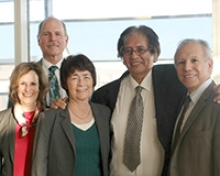New Lecture Series Articulates Campus’s Core Values
 Carlos Castillo-Chavez has had, by all accounts, an extraordinarily successful academic career.
Carlos Castillo-Chavez has had, by all accounts, an extraordinarily successful academic career.
He began as an immigrant from Mexico City and wound up researching and teaching at Cornell University for 18 years before moving to Arizona State University in 2004 — with multiple awards and honors in between.
But he didn’t do it alone.
Castillo-Chavez gave the inaugural talk in the new Chancellor’s Dialogue on Diversity and Interdisciplinarity lecture series on March 17. The series highlights UC Merced’s commitment to interdisciplinary research and campus diversity and inclusion — critical components of student success, as Castillo-Chavez made clear through the personal stories he shared.
Castillo-Chavez is a Regents’ professor and the Joaquin Bustoz Jr. Professor of Mathematical Biology at Arizona State University. He conducts research at the interface of the mathematical, natural and social sciences, examining the role of dynamic social landscapes on disease dispersal — most recently the zika, dengue and chikungunya viruses.
He has authored or co-authored more than 200 publications and a dozen books, and mentored more than 400 undergraduate and graduate students. His recognitions include three White House awards — in 1992, 1997, and 2010 — as well as the 12th American Mathematical Society Distinguished Public Service Award in 2010 and many others.
But it has been a long road.
After arriving in the U.S. in 1974, Castillo-Chavez applied to the University of Wisconsin, Stevens Point.
“I got admitted because I don’t think they ever rejected anyone,” Castillo-Chavez joked. But his larger point was serious: “This is why smaller institutions are so important. Sometimes we make assumptions that the good students are elsewhere, but that’s just not true.”
During the talk, Castillo-Chavez referred to specific moments — such as the time the chancellor of his undergraduate institution arranged for $400 in emergency financial aid so he could afford to complete his bachelor’s degree — as critical turning points in his life.
Perhaps even more impactful was the dinner conversation early in his graduate career in which his adviser casually referred to the fact that some minority students didn’t need help to succeed.
“I went home in tears,” Castillo-Chavez said. “And I left that graduate program not long after.”
But it didn’t stop him.
Castillo-Chavez went on to complete his doctoral degree at the University of Wisconsin, Madison. He did his postdoctoral work at Cornell, where he was later hired as an assistant professor and ascended the ranks to full professor.
Mentorship Mission
Over the course of his career, Castillo-Chavez has made it his mission to provide underrepresented students with the kind of excellent mentorship he himself received.
Perhaps most significant to this effort, Castillo-Chavez founded and is the director of the Mathematical and Theoretical Biology Institute (MTBI), an undergraduate research institute that aims to increase the number of underrepresented minorities in the academy, providing research opportunities at the intersection of biological, computational and mathematical sciences.
A unique element of the MTBI program is that students come together to decide on their own research questions. They then work with the faculty to find solutions to the problems — something that upends the typical teacher-student dynamic and may be a key to the program’s success.
Since 1996, the MTBI it has recruited and enrolled more than 400 students, and 70 percent of domestic MTBI students have gone on to enroll in graduate or professional school programs. One-third of those students have already been awarded their doctoral degrees — a remarkable feat given the national attrition rate of graduate students in particular.
Castillo-Chavez’s talk helped illuminate some of the key concerns UC Merced hopes to address with the Chancellor’s Dialogue series.
“Diversity and interdisciplinarity are the foundational pillars of graduate education at UC Merced,” said Vice Provost and Graduate Dean Marjorie Zatz, a key organizer of the series and the inaugural event. “But it is only through articulation of what these concepts really mean to each of us, and continued conversation about the value of including diverse perspectives, that we can truly advance our knowledge and understanding.
“I am confident that the speakers in this series will continue to challenge us to be the very best researchers and educators that we can possibly be.”
The next lecture in the new series will take place in the early fall.
Chancellor Dorothy Leland looks forward to advancing this critical conversation further with each talk.
“As we welcome many new faculty members and researchers in the next several years, the Chancellor’s Dialogue series will become an increasingly important opportunity to further strengthen our commitment to diversity and interdisciplinary scholarship,” Leland said.
